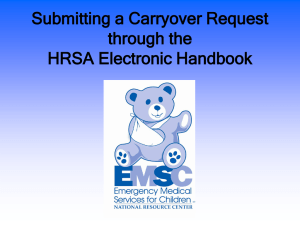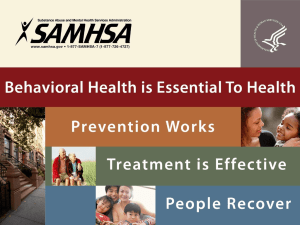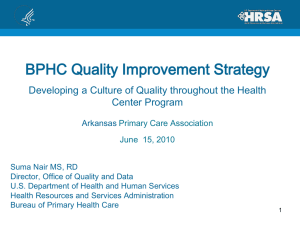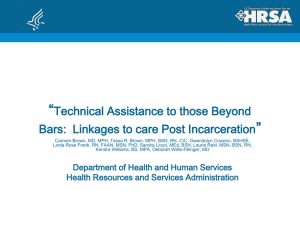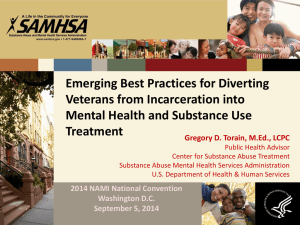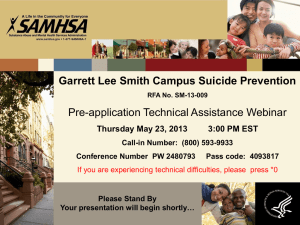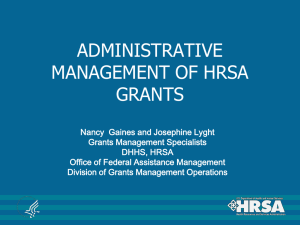Jon Perez, SAMHSA, Regional Administrator
advertisement
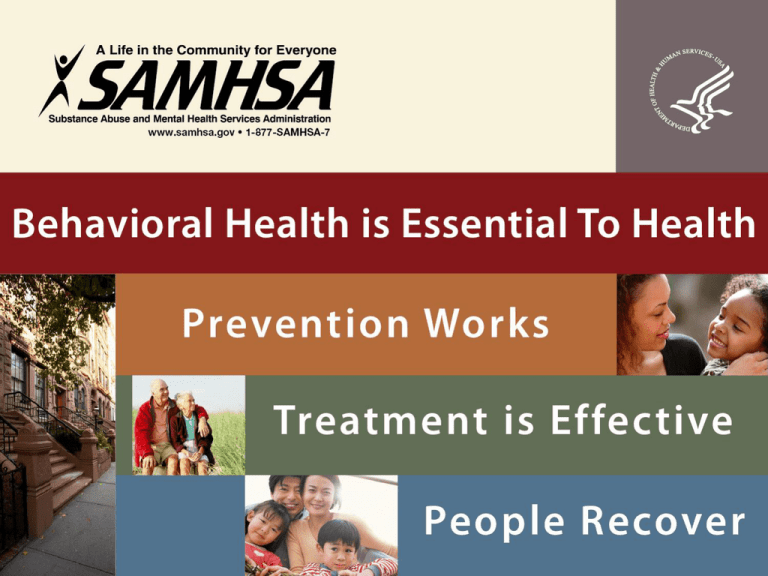
Kern County Grant Summit: SAMHSA Overview and Grant Opportunities January 30th, 2015 Jon Perez SAMHSA Regional Administrator DHHS Region IX DHHS Organizational Chart 3 3 SAMHSA 4 – One of 11 DHHS Grant making agencies – Approximately 550 employees – 10 Regional Offices – SAMHSA’s FY 2014 budget approximately $ 3.6 billion Region X: Seattle AK, ID, OR, WA David Dickinson 2201 6th Ave, MS RX-02 Seattle, WA 98121 Region VIII: Denver CO, MT, ND, SD, UT, WY Charles Smith, PhD 1961 Stout Street Denver, CO 80294 Region VII: Kansas City IA, KS, NE, MO Vacant 601 East 12th St Kansas City, MO 64106 Region V: Chicago IL, IN, MI, MN, OH, WI Jeffrey A. Coady, PsyD 233 N Michigan Ave Chicago, IL 60601 Vacant Region I: Boston CT, ME, MA, NH, RI, VT Kathryn Power, MEd JFK Federal Building Boston, MA 02203 Region II: New York NJ, NY, PR, VI Dennis O. Romero 26 Federal Plaza New York, NY 10278 Region III: Philadelphia Substance Abuse and Mental Health Services Administration Regional Administrators January 2015 Region IX: San Francisco AZ, CA, HI, GU, NV, AS, CNMI, FSM, MH, PW Jon Perez, PhD 90 7th Street, 8th Floor San Francisco, CA 94103 DE, DC,MD, PA, VA, WV Jean Bennett, PhD 150 S. Independence Mall West Philadelphia, PA 19106 (o)215.861.4377 (c)202.446.4710 Jean.Bennett@samhsa.hhs.gov Region VI: Dallas AR, LA, NM, OK, TX Michael Duffy RN, BSN 1301 Young St, Dallas, Texas 75202 Region IV: Atlanta AL, FL, GA, KY, MS, NC, SC, TN Stephanie McCladdie 61 Forsyth Street, S. W. Atlanta, GA 30303 Pacific Region 6 6 Pacific Region 7 1 Regional Administrator Roles 8 Represent the Administrator in the Region Behavioral Health: A National Priority 9 Behavioral health is essential to health • SAMHSA’s Mission: Reduce the impact of substance abuse and mental illness on America’s communities Prevention works Treatment is effective People recover SAMHSA Core Functions 10 • Leadership and Voice • Data/Surveillance • Practice Improvement -- Technical Assistance, Quality Measures, Evaluation/Services Research • Public Awareness and Education • Grant-making • Regulation and Standard Setting SAMHSA OF THE FUTURE – FY 2014 AND BEYOND 11 SAMHSA’s Strategic Initiatives 2015 – 2018 SAMHSA’s Strategic Initiatives 2011 – 2014 Resource Investment Policy Health Financing Communications Staff Development 1. Prevention 2. Health Care and Health Systems Integration 3. Trauma and Justice 4. Recovery Support 5. Health Information Technology 6. Workforce SAMHSA’s Strategic Initiatives Data 7. 8. Prevention Trauma and Justice Military Families Recovery Support Health Reform Health Information Technology Data, Outcomes & Quality Public Awareness & Support Business Operations 1. 2. 3. 4. 5. 6. FY 2009 – FY 2015 Prevention Funds PHS Funds Budget Authority 12 * FY 2014 & FY 2015 totals include $1.5 M each year for extraordinary data and publication requests user fees SAMHSA Grant Funding, CA 2014-15 13 California Formula Funding Substance Abuse Prevention and Treatment Block Grant $249,086,920 Community Mental Health Services Block Grant $62,185,567 Projects for Assistance in Transition from Homelessness (PATH) $8,810,000 Protection and Advocacy for Individuals with Mental Illness (PAIMI) $3,169,574 Subtotal of Formula Funding $323,252,061 Discretionary Funding Mental Health $31,267,836 Substance Abuse Prevention $15,276,043 Substance Abuse Treatment $26,675,420 Subtotal of Discretionary Funding $73,219,299 Total Funding Total Mental Health Funds $105,432,977 Total Substance Abuse Funds $291,038,383 Total Funds $396,471,360 http://www.samhsa.gov/grants-awards-by-state/California SAMHSA Budget FY 2014 14 • One page overview – http://www.samhsa.gov/newsroom/advisories/14 02112340.aspx • HHS/SAMHSA FY 2014 Budget Website (beta) – http://beta.samhsa.gov/budget/fy-2014-budget Health Reform 15 Bending the Cost Curve, Lowering Health Care Growth: Must Address Behavioral Health 16 Better Integrated Care Expanded Coverage to Uninsured Pay for Outcomes, Not Units Prevention & Wellness 16 BH Impact on Physical Health 17 MH problems increase risk for physical health problems & SUDs increase risk for chronic disease, sexually transmitted diseases, HIV/AIDS, and mental illness People with M/SUDs are nearly 2x as likely as general population to die prematurely, often of preventable or treatable causes Cost of treating common diseases higher when a patient has untreated BH problems • Hypertension – 2x the cost • Coronary heart disease – 3x the cost • Diabetes – over 4x the cost M/SUDs rank among top 5 diagnoses associated with 30-day readmission; one in five of all Medicaid readmissions • 12.4 percent for MD • 9.3 percent for SUD Individual Costs of Diabetes Treatment for Patients Per Year $300,000,000 $250,000,000 $200,000,000 $150,000,000 $100,000,000 $50,000,000 $0 With behavioral health With diabetes alone problems and diabetes ESSENTIAL HEALTH BENEFITS (EHB) 10 BENEFIT CATEGORIES 18 1. Ambulatory patient services 2. Emergency services 3. Hospitalization 4. Maternity and newborn care 5. Mental health and substance use disorder services, including behavioral health treatment 6. Prescription drugs 7. Rehabilitative and habilitative services and devices 8. Laboratory services 9. Preventive and wellness services and chronic disease management 10. Pediatric services, including oral and vision care Health Reform: Impact of the Affordable Care Act 19 • Focus on primary care & coordination w/ specialty care • Emphasis on home & community-based services; less reliance on institutional & residential care (health homes) • Priority on prevention of diseases & promoting wellness • Focus on quality rather than quantity of care (HIT, accountable care organizations) • Behavioral health is included – parity ACA and California (as of appx. April 2014) 20 • 1,405,102 individuals selected a Marketplace plan between October 1, 2013 and March 31, 2014 • 1,177,000 Californians enrolled in Medicaid and CHIP through the end of March 2014 • 2,582,102 Total new beneficiaries • expands mental health and substance use disorder benefits and federal parity protections for: • 7,559,245 Californians http://www.hhs.gov/healthcare/facts/bystate/ca.html ACA and California (as of appx. April 2014) 21 • $1,065,683,056 in grants for research, planning, information technology development, and implementation of its Marketplace http://www.hhs.gov/healthcare/facts/bystate/ca.html SAMHSA Grant Opportunities 22 SAMHSA Discretionary Grant Opportunities Page 23 http://samhsa.gov/grants/grant-announcements SAMHSA Discretionary Grant Forecast 24 The SAMHSA forecast (PDF | 290 KB) provides information on SAMHSA’s upcoming Requests for Applications (RFAs). Prospective Applicants can learn more about SAMHSA’s plans for release of RFAs including brief program descriptions, eligibility information, award size, award number and proposed release date. http://www.samhsa.gov/grants/grant-announcements-2015 Discretionary Grant Announcement Page Example 25 26 SAMHSA PRIORITY AREAS EVIDENCE-BASED PRACTICES THROUGH BLOCK GRANTS 27 • Substance Abuse Prevention and Treatment Block Grant (SABG) – $1.8 B – Maintains FY 2014 level (+ $ 110 M over FY 2013) • Community Mental Health Services Block Grant (MHBG) – $ 484 M – Maintains FY 2014 level (+ $ 47 M over FY 2013) – Continues new FY 2014 5 percent set aside • For “evidence-based MH prevention and treatment practices to address the needs of individuals with early SMI, including psychotic disorders,” regardless of age at onset STRENGTHENING AND INTEGRATING CARE 28 • Primary Care and Addiction Services Integration (PCASI) – + $20 M – Allow addiction treatment providers to offer an array of physical health and addiction treatment services – Modeled after Primary/Behavioral Health Care Integration (PBHCI) program • HIV/AIDS Continuum of Care – $24 M of existing resources – Links Minority Aids Initiative, PBHCI, and PCASI – Builds on FY 2014 pilot PROTECTING THE HEALTH OF CHILDREN AND COMMUNITIES 29 • Now Is the Time – $130 M (+ $15.0 M) – $115 M continued from FY 2014 – Science of Changing Social Norms (+ $4 M) – Peer Professionals (+ $10 M) – Workforce Data (+ $1.0 M) NOW IS THE TIME – FY 2014 $115 M CONTINUED IN FY 2015 30 • $55 M – Project AWARE to improve MH awareness, increase referrals to BH services and support systems – $40 M for Project AWARE state grants – $15 M for Mental Health First Aid • $20 M – Healthy Transitions to support youth ages 16 to 25 w/ MH and/or SA problems, and their families • $40 M – BH Workforce activities: – $35 M jointly administered w/ HRSA to expand the Mental and Behavioral Health Education and Training (MBHET) Grant Program – $5 M for expansion of Minority Fellowship Program - Youth BUILDING THE WORKFORCE 31 • $56 M in Now Is the Time (+ $ 11 M) – In collaboration with HRSA – Adds commitment to BH workforce data – Maintains most of FY 2014 increase to Minority Fellowship Program – Adds commitment to peer/paraprofessional workforce REACHING AMERICANS IN COMMON HEALTHCARE SETTINGS 32 • Grants for Adult Trauma Screening and Brief Intervention (GATSBI) – + $2.9 M – Repeat request from FY 2014 – To advance the knowledge base to address trauma for women in primary care, OB/GYN, and emergency departments of hospitals and urgent care settings – Will be developed by SAMHSA in consultation with ACF, CDC, NIAAA, NIDA, NIMH, and VA FIGHTING PRESCRIPTION DRUG ABUSE 33 • State Grants within Strategic Prevention Framework Program (SPF Rx) – + $10 M – Enhance, implement and evaluate state strategies to prevent prescription drug abuse/misuse – Improve collaboration on risks of overprescribing and use of Prescription Drug Monitoring Programs (PDMPs) between states public health and behavioral health authorities, and pharmaceutical and medical communities – Coordinated with new CDC program PREVENTING SUICIDE 34 • National Strategy for Suicide Prevention (NSSP) Implementation – + $2.0 M – Assist states in establishing and expanding evidencebased suicide prevention efforts – Address middle age population – most # deaths – Improve follow-up after suicide attempts – Goals • Reduce # of deaths by suicide • Reduce # of suicide attempts • Tribal Behavioral Health Grants – $5 M – Continued from FY 2014 BUILDING PARTNERSHIPS EXPANDING PRACTICES THAT WORK 35 • Building BH Coalitions (BBHC) – – $3.0 M of existing resources – Jointly administered by Center for Mental Health Services (CMHS) and Center for Substance Abuse Prevention (CSAP) – Working to address shared risk and protective factors for substance abuse and mental illness – Building resilience and emotional health Contact Information 36 Jon T. Perez, Ph.D. Regional Administrator, HHS IX Substance Abuse and Mental Health Services Administration 90 Seventh Street, 8th Floor San Francisco, CA 94103 415 437 7600 jon.perez@samhsa.hhs.gov HRSA Overview for Kern County Grant Summit Bakersfield, California January 30, 2015 37 HRSA - America’s Health Care Safety Net Mission: Improve Access to Quality Health Care and Services Strengthen the Health Workforce Build Healthy Communities Improve Health Equity Major Programs: Community Health Centers Maternal and Child Health Ryan White HIV/AIDS Health Workforce Training Rural Health 340B Drug Discounts, Vaccine Injury Compensation, Organ and Tissue Donation Regional Offices and Networks 38 HRSA National Activities • 21.7 million patients served, 75% of whom with incomes below the poverty level. (UDS 2013) • Over 10,400 HRSA-supported health centers sites (11/20/14) • Over 500,000 people living with HIV/AIDS receive services through more than 900 HRSA-funded Ryan White Clinics . Two-thirds are members of minority groups. • 34 million women, infants, children, and adolescents benefit from HRSA’s maternal and child health programs. • 7,067 National Health Service Corps clinicians are working in underserved areas in exchange for loan repayment or scholarships. (HRSA Data Warehouse 1-16-15) 39 Major HRSA Activities in California • The Community Health Center Program serves over 3,412,961 patients (UDS 2013) in California at 1,224 Health Center sites. (HRSA Data Warehouse 1/16/15) • The National Health Service Corps provides loan repayment and scholarship support to NHSC healthcare providers in California. 465 clinicians are caring for people who live in areas where health care is hard to find, which are known as Health Professional Shortage Areas. (HRSA Data Warehouse 1-16-15) • The Ryan White Care Act Program support care to 58,177 patients in California. (2012 data) 40 Community Health Center Program o Located in or serve a high need community o Governed by a community board o Provide comprehensive primary health care o Primary & Preventive Care o Enabling Services o Provide services available to all with fees adjusted based on ability to pay. o Meet other performance and accountability requirements regarding administrative, clinical, and financial operations 41 HRSA -National Health Service Corps Bureau of Health Workforce recruits fully-trained professionals to provide culturally-competent, interdisciplinary primary health and behavioral health care services to underserved populations. In return, the NHSC programs assists in the professionals' repayment of qualifying educational loans that are outstanding. 80% stay in the underserved area after fulfilling the NHSC service commitment 42 https://nhsc.hrsa.gov/ 43 43 HRSA - Maternal and Child Health Programs o Home Visiting Program o Nurses, social workers, and others provide counseling and intervention services to expectant mothers in communities where health services are scarce o National Resource Centers o Technical assistance for school-based mental health o Healthy Start sites o Provide depression screening, case management, and community-based outreach to expectant mothers o Bright Futures Guidelines: http://brightfutures.aap.org/ o Chapter discusses drug and alcohol use/ screening of youth 44 HRSA- Regional Operations Office of Regional Operations (ORO) works through HRSA's ten regional offices to improve health care systems and America’s health care safety net, increase access to quality care, reduce disparities, and advance public health. o HRSA Region IX Office in San Francisco is point of contact for questions about HRSA. o Works closely with HHS Regional Director and other HHS Operational Division. 45 Finding HRSA Grants To find grants, and apply, review, manage, and get reports: http://www.hrsa.gov/grants To find open opportunities, tips, and technical assistance: http://www.hrsa.gov/grants/index.html To find out how to become a grant reviewer: http://www.hrsa.gov/grants/reviewers/index.html 46 46 Find Opportunities Register to get email notifications when opportunities are available: http://www.grants.gov/applicants/email_subscription.jsp http://www.hrsa.gov/grants Need Help? Contact Grants.gov Help Desk at 877-464-4772. 47 47 HHS Grants Forecast The Department of Health and Human Services' Grants Forecast is a database of planned grant opportunities proposed by its agencies. Each Forecast record contains actual or estimated dates and funding levels for grants that the agency intends to award during the fiscal year. Forecast opportunities are subject to change based on enactment of congressional appropriations. http://www.acf.hhs.gov/hhsgrantsforecast/index.cfm (Screenshot from 1-16-15 below) 48 HRSA- Key Web Resources HRSA’s Funding Opportunities (Competitive Grants): http://www.hrsa.gov/grants/index.html HRSA Grantees with Active Projects by Program or State granteefind.hrsa.gov HRSA’s Find a Health Center site findahealthcenter.hrsa.gov/ National Health Service Corps (NHSC): www.nhsc.hrsa.gov HRSA’s Databank of HRSA programs datawarehouse.hrsa.gov/ 49 Contact Information Hal Zawacki Office of Regional Operations – Region IX San Francisco U.S. Department of Health and Human Services Health Resources and Services Administration 90 Seventh Street - Room 8-310 San Francisco, CA 94103 Telephone: 415-437-7566 hzawacki@HRSA.gov 50
